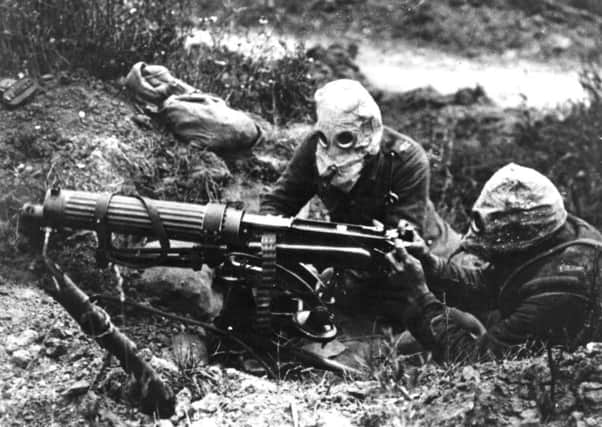Scotland must remember and learn from First World War '“ Fiona Hyslop


One hundred years is no doubt a milestone – and it certainly feels like World War One, which cast a long shadow over the entire 20th century, is passing further into history.
That, of course, makes it all the more important that we do everything we can to ensure that the conflict, and those who gave their lives, are never forgotten.
Advertisement
Hide AdAdvertisement
Hide AdBack in 2013, with the centenary of the outbreak of war approaching, I appointed the Scottish Commemorations Panel – a 13-strong panel of experts with backgrounds in history, education, media, military and faith matters. Their aim was to recommend and deliver commemorations to mark the events and battles with a particular significance for Scotland.
Since then, through the Commemorations Programme, the people of Scotland have learnt about the effects of the war and its lasting social and civic impact on our nation.
Thanks to this work, tragedies such as the Quintinshill rail crash and the sinking of HMS Otranto and SS Tuscania off the coast of Islay are now more well known. On a similar theme, in January we will remember the horrific loss of naval yacht HMY Iolaire, when 201 people, mostly men returning from the war, tragically died when the vessel struck rocks on a reef called the Beasts of Holm near Stornoway, in Lewis.
The programme has overseen a wide range of events to commemorate various battles and to acknowledge the debt we owe to those who gave their lives for their country since 1914.
The centenary of the Battle of Loos, which saw huge losses for Dundee’s Black Watch Infantry battalion, was commemorated at an open-air service outside the Caird Hall. Organised with Dundee City Council, the event was well attended by many local people and veterans.
The Battle of Jutland was commemorated in North and South Queensferry, marking the departure in 1916 of the Grand Fleet from the Forth to engage with the enemy. Scotland’s Dazzle ship lay at anchor under the Forth Bridge as HMS Kent symbolically sailed downstream.
The Battle of Arras had the greatest number of Scots battalions at the start of any battle and, as a result, a large number of Scottish casualties. School pupils representing every local authority in Scotland were taken to Faubourg d’Amiens cemetery at Arras in April 2017, where many of the casualties from the battle lie, and where a service of remembrance was held. In the evening, simultaneously in Arras and Edinburgh, Beating Retreats were held in front of large crowds. A year earlier, a moving vigil was held in the Shrine of the Scottish National War Memorial throughout the night of 30 June 2016 to mark the centenary of the start of the most infamous battle of all, the Somme.
These commemorations have truly been a national effort – covering the length and breadth of Scotland from Dumfries to Orkney and Islay to Dundee. In fact, the moving musical production, Far, Far From Ypres has visited no less than ten different locations around Scotland since August, playing to school pupils in the afternoon and ticketed at night. And on Sunday night, both the First Minister and I will attend a performance at the Usher Hall in Edinburgh.
Advertisement
Hide AdAdvertisement
Hide AdScotland’s commemorations have been wide and varied, from a UK-wide conference at St Andrews to celebrating the life and work of Dr Elsie Inglis, founder of the Scottish Women’s Hospitals for Foreign Services, which provided nurses, doctors, ambulance drivers and cooks. Her determination to do something positive demonstrated the important role women played in the First World War.
The work of the Commemorations Panel has been supported by the initiatives of many organisations across Scotland from the National Museum of Scotland’s “Next of Kin” touring exhibition to the National Theatre of Scotland’s The 306: Dusk production.
Throughout the past four years, a strong emphasis has been the strapline, What Do We Learn From All This? Legacy has been a key objective not only in the national programme but in the many local events which have taken place. We are working with Poppy Scotland and Education Scotland to ensure the many detailed and well-researched programmes produced for each event can continue to be accessed by schools and the wider public in the years to come.
I would like to thank and pay tribute to the work of the Scottish Commemorations Panel, chaired by Norman Drummond, for their commitment to ensuring that Scotland has marked World War I with events and services reflecting the many impacts that war and the enormous loss of life has on people and communities across Scotland.
Scotland’s national service on Sunday at Glasgow Cathedral will reflect on the emotions experienced by those who lived through the First Armistice, commemorate those who made the ultimate sacrifice in conflicts during the last century, and give thanks to those who continue to serve today. I look forward to representing the Scottish Government at what will be a poignant occasion, along with the First Minister.
Similar services will take place across England, Wales and Northern Ireland, while the Scottish Parliament will also mark the occasion with a floodlit projection of the names of those who died during the conflict.
And as we reflect this week on the impact of the war and pay our respects to those who made the ultimate sacrifice in World War I and in conflict since, we should make a commitment to never forget what we owe to those who died and to those whose lives were never the same again.
Fiona Hyslop is Scottish Culture Secretary and MSP for Linlithgow
